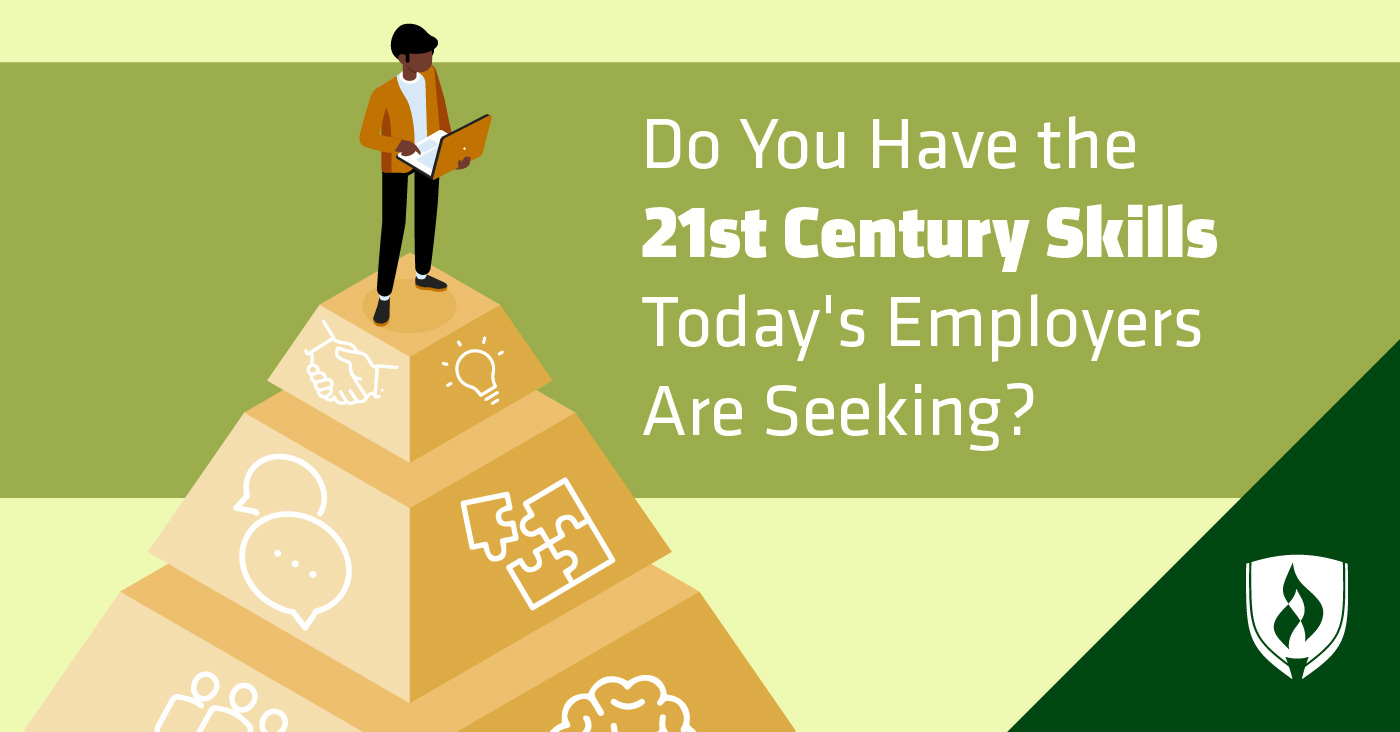As technology progresses at a dizzying speed, so does the world of the work. Every year it seems there’s some new technology, skill or device professionals are scrambling to master. This steady influx of new tech and skills to master can make it feel like you’ll never catch up.

Though you can’t anticipate the technology that’s not yet on the market, you can prepare for career success by focusing on the fundamental skills needed to navigate these fast changing times—what some have dubbed “21st century skills.” These are the transferable “soft” skills that can be applied in a variety of settings an can help you as you master more technical skills.
Though the software or tools you use to perform your job will likely change in the next five, ten or twenty years, the soft skills you develop will last a lifetime. Let’s dive in to what 21st century skills are, why they’re important and how you can develop many of them in yourself.
What are 21st century skills?
In short, these are the broad skills and abilities needed to be successful in modern society. Over the years, groups of educators, academics and governmental agencies have worked to identify and promote these foundational skills in order to prepare the workforce for what’s to come. While you may see small variations in how 21st century skills are described and defined from group to group, they fundamentally fall into three categories:
- Learning skills: The skills used to process and communicate information. This includes creativity, critical thinking ability, collaboration and communication.
- Literacy skills: These are the skills employed to develop savvy and informed researchers and thinkers. This includes information literacy, media literacy, technology literacy—all of which focus on your ability to evaluate and process new information, particularly information found online.
- Life skills: The skills needed create a well-round individual that can thrive both in their personal and work lives. This includes adaptability, leadership, initiative, efficiency and social skills.
9 Essential 21st century skills for any career
Clearly 21st century skills can cover a lot of ground—and while all are worth developing, you may be looking for a way to narrow your focus. We asked career professionals to identify what they believe are the most important soft skills for employees today.
1. Creativity
Creativity is key for many industries and positions in the 21st century. Any company or industry in need of innovation should be searching for employees with loads of creativity. The ability to think outside of the box allows companies to adapt to changing markets and find innovative ways to resolve potential problems.
If you often feel stuck when brainstorming or problem-solving, don’t worry—creativity can be cultivated. Staying up-to-date with news and trends within your industry and others can get your creative juice flowing. “I do a lot of reading and encourage my team members to do the same. It keeps us energized, integrated and creative,” says Michael Stahl, executive vice president and CMO at HealthMarkets.
2. Critical thinking
Critical thinking is the key to students and employees coming to logical and well-reasoned conclusions. Well-developed critical thinking skills help us objectively analyze a situation, weigh options and identify potential outcomes to any decision.
It’s not hard to see how this ability can be valuable in life—and employers certainly appreciate an employee who is forward-thinking enough to predict and plan for future problems before they’ve even happened.
“If you can start to think in that way, you’ll be a valuable asset to any employer,” says Jon Hill, CEO of The Energists.
Like any skill, critical thinking can be refined through practice. Try walking through your day with problem-solving glasses on. For example, if you’re stuck in a long line at the grocery store run though the situation—what’s the primary cause of the delay? What can be done to help? Could this solution have an effect on other areas in the store? Just getting into an evaluation and problem-solving mindset can go a long way in refining your critical thinking abilities.
3. Collaboration
Collaboration is another key 21st century learning skill that will play a big role in your career no matter your job title. Collaboration means being willing to listen, learn and work with others to accomplish a goal together. The modern workforce is full of employees with highly specialized skills and knowledge. This doesn’t mean you’ll need to be able to do every job, but you better be able to collaborate with these people effectively.
It’s especially important to demonstrate your ability to work well with others at the start of your career when you don’t necessarily have enough experience to deliver high-end results on your own. “If you’re able to work effectively with your peers, you’ll be able to get much-needed help, expand your expertise and as a result, deliver better work,” says Pete Sosnowski, head of HR and co-founder at Zety.
If you have a tough time asking for help from others or working with a team, try getting involved in projects or volunteer work that forces you to rely on someone who knows more than you.
4. Communication
Communication is probably a skill you are sick of hearing about—but there’s no denying the value of being an effective communicator. It’s universally useful and your ability to communicate trickles into all aspects of life.
“With so much automation that enables smooth work processes, communication is the one skill that remains critical for a healthy company culture,” says Darko Jacimovic, co-founder of WhatToBecome.
All of the technical knowledge and skill in the world isn’t worth much if you can’t effectively get your point across in a respectful and coherent way.
5. Information literacy
Whether you’re doing research for a paper at school or a report or presentation at work, information literacy is key. Information literacy is the foundational skill that media literacy is built on. A student or employee with this skill is able to separate fact from fiction by interpreting facts and raw data they might find online.
“A recent graduate should be able to find reliable information, judge what can be used to indicate performance and act on those judgments,” says Alexander M. Kehoe, Co-Founder & Operations Director at Caveni Digital Solutions.
Students can easily refine information literacy skills while in school through the scholarly writing process, according to Kehoe. “A lot of research projects require good information literacy skills to correctly interpret results and draw conclusions in a written setting.”
6. Adaptability
Though this isn’t necessarily a quality you’ll see listed in a job description, the ability to demonstrate flexibility can make or break or a job interview.
The job market is changing quickly. Adaptable employees are flexible in several ways. They should be able to work both remotely or in the office, independently and with a team. They’re also open-minded, interested in new ideas and willing to take on new tasks.
How can you practice being flexible? Though lunch-break yoga won’t necessarily do the trick, getting out of your comfort zone regularly will. Try a new hobby, shadow a co-worker for the day to see what they do or attend a conference focused on a new-to-you topic.
7. Leadership
If you think leadership is just for the CEOs or your manager, think again. No matter what your ambitions are, cultivating leadership skills while in school or while working that entry-level job can lead to greater opportunities in the future.
“If a college graduate shows a predisposition for leadership early in their career—this shows potential and promise for the future,” says Jagoda Wieczorek at ResumeLab.
Since leadership involves many other traits including humility, decisiveness and managerial competence, working to developing leadership skills as a whole can seem vague or overwhelming. Experience here is often the best teacher. If you’re still in school, consider running for class president or heading up a club. If you’re a parent, you could join the PTA or volunteer to coach your kid’s sports team.
8. Social skills
The phrase social skills may seem vague to you—what exactly are social skills? How many are there?
Though the answer may change depending on who you talk to or which article you click on, Jasmine Chen, founder of Capsule, believes that social skills are rooted in self-awareness, self-regulation and empathy.
Self-awareness and regulation means understanding and managing yourself including your past, values, motivations and stressors. “If you’re not in touch with your emotions or triggers, you won’t know what sets you off or how to manage it if it does,” says Chen. This could affect your attendance, your rapport with colleagues and your performance. Though it’s not flashy, glamorous work, it’s important. Try asking for more feedback from your boss and colleagues about your behavior, or give daily journaling a go.
Empathy can help you become a better listener and in turn a better colleague. If you can relate to a client’s or colleague’s problem or distress, you’ll form stronger relationships and may be able to suggest better solutions.
Though it may be tough, working on your social skills is always worth it. “Good social skills ensure that a candidate can interact and work well with others, understanding the nuances of social interactions, bring the best out of others and ultimately, function as a part of a team,” says John Moss, CEO of English Blinds.
Moss recommends making an effort to engage with others from different walks or life outside of work or school. It doesn’t hurt to do some subtle people-watching as well to learn more about how others interact and think about what you’d like to emulate or avoid.
9. Productivity
Despite what entrepreneur influencers may post on social media, productivity is not about #thehustle or burning the candle at both ends. Productivity is about efficiency. “There is a big difference between busy and being productive,” says John Frigo of My Supplement Store. “Don’t confuse movement with action. You can run in place all day and not get anywhere.”
Instead of just working to get stuff done, evaluate your daily or weekly routines and consider how you can simplify and re-invent your job for the sake of your team and the quality of your work.
Learn how to make “smart to-do” lists, ones you can actually accomplish and don’t just overwhelm you with a multitude of tasks.
Are you ready to take on the next century of work?
Now that you’re familiar with what 21st century skills are and why they’re so important to your long term employment prospects, it might be a good time to take a little self-inventory. Do you have the transferable skills needed to navigate this fast changing modern economy? There’s no shame if you can think of a few that need polishing up. The good news is that, like all skills, 21st century skills can be refined with practice—whether that’s in the form of formal education, employer-sponsored development or just simple focused repetition in your everyday life.
If you’re considering the formal education route for developing your skillset, there are a few questions you’ll want to ask yourself first. Start weighing your options by reading our article, “Should I Go Back to School? 4 Questions to Help You Find Your Answer.”




